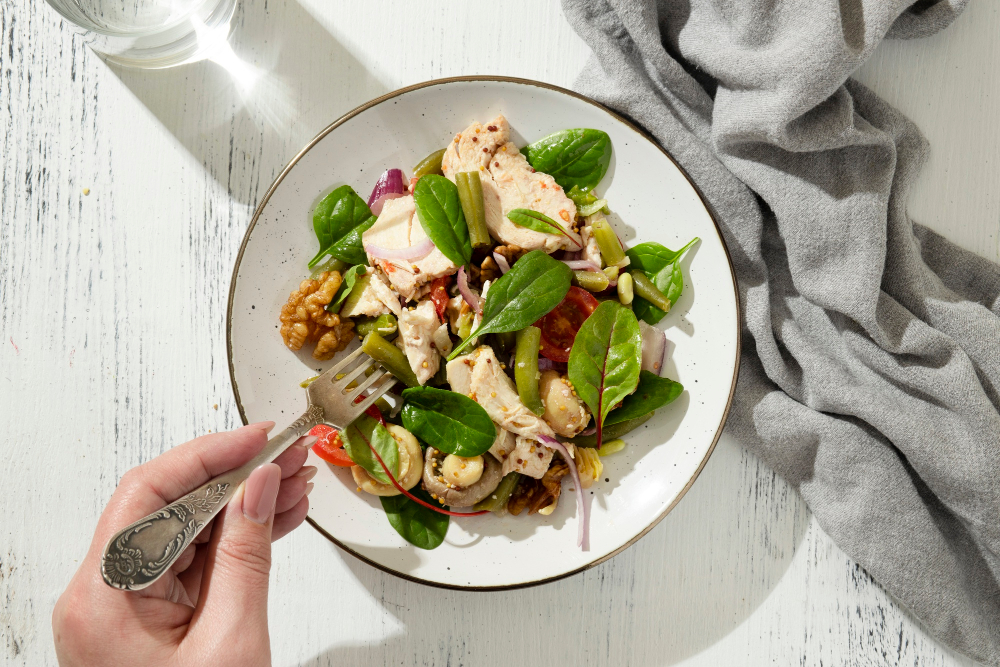Keto fruits: what fruits can you eat on a keto diet?

Keto fruits: what fruits can you eat on a keto diet?
Fruits are foods we enjoy eating all year round – especially in the summer. Unfortunately, many of them are high in carbohydrates, making them something to avoid on a ketogenic diet. Is it okay to eat fruit on keto? What fruits are best on keto? I’ll answer these and many other questions about keto fruit in this post.
🆂🅾🆄🆁🅲🅴 https://www.duolife.ie/keto-fruits-what-fruits-can-you-eat-on-a-keto-diet/
The ketogenic diet and fruit
As you probably know, the ketogenic diet is a way of eating based on a high intake of healthy fats, moderate protein and very low carbohydrates. This distribution of macronutrients allows us to enter the desired keto state of ketosis, in which our body uses fats, rather than carbohydrates, as a source of energy. Ketosis has a number of positive health effects, such as lowering and stabilizing blood sugar levels or blood pressure, and in combination with a caloric deficit also allows for effective fat burning – even from problematic areas.
The classic ketogenic diet requires a carbohydrate intake of 5% or less of your total daily caloric intake. This is very little – on a traditional diet, carbohydrate intake is recommended at 45-65% of your daily caloric intake, and many people far exceed this recommended amount.
When switching to keto, it’s important to remember that your daily carbohydrate intake limit should include all of your sugar intake (minus the dietary fiber). This means that giving up sweetened tea or excluding sweets is not enough – keeping an eye on your carbohydrate intake is key to entering and maintaining ketosis. Since most of the carbohydrate intake on keto comes from vegetables, essential for providing the body with many essential nutrients, the room for maneuver is really small.
Does this mean that fruits on keto are forbidden foods? No. I’ll say more – you shouldn’t eliminate them from your diet completely, if only because of the vitamins they provide to our bodies. It is enough to consume them in small quantities and to know which fruits to choose in ketosis to maintain this metabolic state of the body without any problems.
What fruits are best on keto?
If you already know what to eat on keto, you can easily apply this knowledge when choosing fruits to enrich your keto menu with. Foods eaten on keto should be high in healthy fats and low in carbohydrates – but since fruits are not fatty foods, the most important feature that fruits on keto should have is low sugar content.
Like other keto foods, keto fruits should also come from verified sources. Choose those grown organically that you have no doubt have been grown without harmful substances. It is also best to rely on seasonal fruits from your climate zone. It is also worth remembering that although it is best to use fresh produce to prepare keto meals, keto fruits frozen in the right way do not lose their nutritional value.
Fruits on keto: which ones to choose?
The ideal fruits on the keto diet should be low in carbohydrates first and foremost – but let’s note that we’re talking about net carbohydrates, that is, with the content of fiber not digested by the body deducted. Fruits allowed on keto are mainly the so-called forest fruits (both wild growing and often included in this group varieties of strawberries growing in farm conditions), but not only. Don’t worry – you definitely won’t complain about boredom!
Fruits allowed on keto include:
avocados – there’s a reason they’re the most popular fruit on the keto diet! They contain plenty of nutrients, including potassium, phosphorus, magnesium, zinc and iron, as well as omega-3 and omega-6 fatty acids, which are especially important on a ketogenic diet. The great thing about avocados is how easy they are to add to virtually any type of meal, from nutritious protein and fat breakfasts to light fit dinners,
watermelons – a great keto fruit for summer, which are characterized not only by their taste, but also their low carbohydrate content with high water content. These are a good choice if you’re craving fruit for keto adaptations,
cantaloupes, honey melons and other low-fructose melon varieties – great sources of vitamin C, and in some cases, A and B. Their low calorie content is an added plus,
blueberries – although they are relatively high in carbs, they are rich in fiber, which is why blueberries on keto are a popular addition to baked goods as well as yogurt and salads. They’re also small, so it’s easy to control the amount you eat them in,
strawberries – many people are surprised that strawberries on keto are among the allowed fruits, but they contain relatively few carbs! Plus, they are rich in vitamin C and manganese,
strawberries – they are rich not only in vitamins, but also in antioxidants and mineral salts, thus helping to maintain good physical health and well-being, prevent cancer and slow down the aging process,
raspberries – another keto fruit rich in both vitamins and fiber. They improve metabolic processes, which makes them helpful in weight loss. In addition, they strengthen the immune system and support the processes of fighting infections and prevent them,
blueberries – have properties similar to raspberries, and additionally contain glucokinins – plant substances supporting lowering and stabilization of sugar level in blood. They also support the processes of removing toxins from the body.
Remember that the presence of a particular fruit in the above list does not mean that you can eat it without any control. Fruits on the keto diet should always be eaten in limited quantities, which should be adapted to an optimized eating plan based on the principles of the ketogenic diet.
Fruits on keto: which ones to avoid?
When it comes to fruits in ketosis, the general rule is simple: the more carbohydrates they contain, the less they should be consumed. This rule applies to plants that are rich not only in fructose, but also in starch – which is why bananas are not the best idea on a ketogenic diet.
Although I mentioned seasonal fruits, not all of them are suitable for eating on a ketogenic diet – cherries or cherries on keto are a rather poor choice. Undesirable fruits on keto also include, for example:
pears,
apples,
grapes,
lychees,
mangoes,
figs,
citrus fruits – although many people on keto add a small amount of lemon or lime juice to water or tea from time to time, both to add flavor to drinks and to provide the body with vitamins.
It is worth remembering that fruits are also preserves – jams, preserves, marmalades, jams, purees, compotes, juices, syrups and the like. Most of them are not suitable for consumption on keto due to their high sugar content.
Dried fruits should also be avoided on keto. An example would be prunes – whether they can be considered a keto fruit depends mainly on their species. In small quantities, it is perfectly fine to use them to make at least a keto cake – however, many people would like to use this type of fruit on keto adaptation, especially if they are struggling with digestive issues. Dried plums on keto are not a good option – in search of relief, it is better to choose fiber-rich fresh fruits, which I mentioned in the previous part of this post.







Responses